Daphne Discloses Turns 2!
Still here two years later. Still rambling on. And celebrating everything.
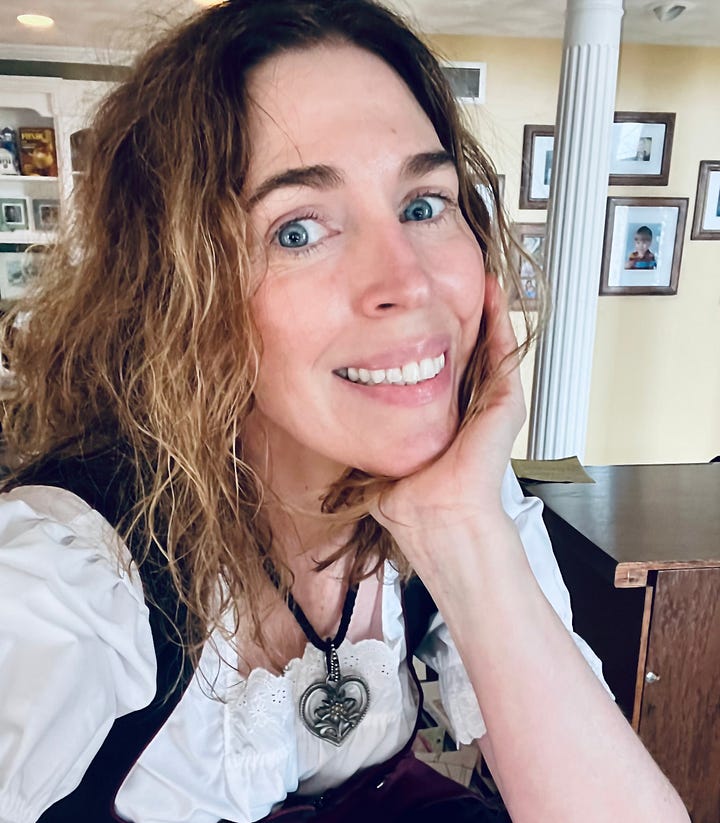
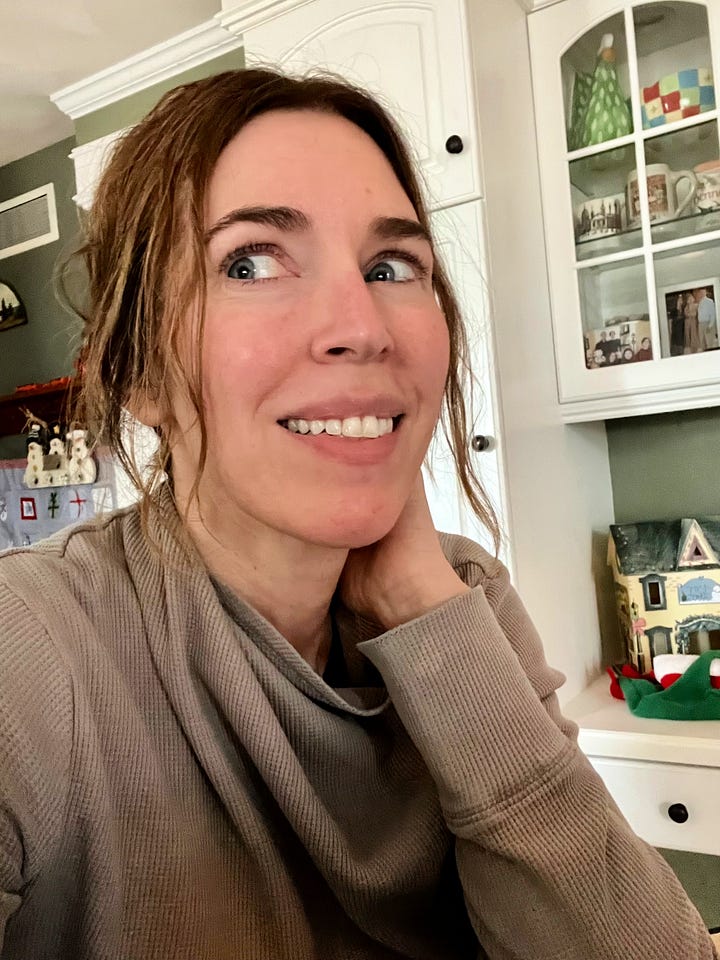
I started Daphne Discloses four months after my brother died. After being welled up with tears, I was welled up words and needed a place to put them.
The day I found out Patrick died, I got a call from Mankato, MN while I was at work. I didn’t recognize the number and put it out of my mind. The police department instead reached my husband.
Brian waited to tell me when I got home. He had the police on standby in case I had (another) panic attack. Honestly, I love him for that. But I didn’t panic. I just felt so fucking mad. Not just from the shock of what happened. But from everything that had happened to him before. And how it never seemed to matter and now never would. Life rolls on after tragedies all the fucking time. Most pain is never noticed. Why the hell is that?
Writing has helped me over these past few years more than I ever would’ve imagined. And because I celebrate everything now, I’m celebrating being here two years later.
In a realm of infinite connections, it’s easy to minimize single interactions. Aside from bots, each interaction, online or IRL, is a connection to a person, a whole real person. Each connection is an opportunity to affect each other, even if only for a split second. I love finding writers and artists who are mindful of that in the best of ways. I aspire to be like them. Every person matters.
* MY FIRST POST and thoughts now *
The Fifty Face Soon to Come
At 48, on the cusp of the aging metamorphosis, I’m a bit scared, but also curious. I’ve always thought of my own body as a science experiment. Puberty. Pregnancy. Illness. Now perimenopause. It’s really interesting to see how a body can change.
Nothing magically happened at 50, but getting older feels more like a “normal” part of my body than it did at 48. The process of aging still fascinates me.
I came across an interesting review while writing about collagen: “The Facial Aging Process From the ‘Inside Out.’” It’s written for aesthetic physicians, but if you’re like me and want to know in detail what’s gonna happen to your face in the upcoming decades, with pictures included, check it out. Of note, the study was funded by a cosmetic pharma company (disclosures matter). But who else would pay for this research?
Here’s a quick summary: Collagen and elastin not only decrease, but become disordered, making the skin less able to hold moisture. But facial aging is way more than what happens to your skin. The face is remodeled from the inside out (bone, fat, muscle, and skin). The cheeks flatten, temples dimple, and eyes sink in. The nose droops and then elongates. Fat pads shift, lips thin out, and the chin and jawlines become less defined.
It makes sense why there really is no way to get old without looking older (no matter how much money or time a person has). Botox can’t shift your bones back. And face cream isn’t gonna change the mismatch that occurs between your facial muscle strength and weakening ligaments, leading to smiles looking more like grimaces.
I’m still wondering about annoying sensory distractions that might come with an aging face. But maybe I should be more worried about this: “Signs of aging may affect interpersonal relationships by influencing perceived character or personality traits or by contributing to erroneously projected emotions (eg, anger, tiredness, or sadness) that do not reflect the individual’s true feelings.”1
I remember my mom telling me when she was in her fifties that she started having to pay attention when someone at work approached her so she could perk up her face. Otherwise, people would misread her at-ease face and think something was wrong.
Maybe we need to teach people to be more aware of using multiple cues to assess how someone might be feeling (and to try to avoid making assumptions). Misreading faces is common for many reasons and at every age. That’s what is so awesome about inclusion. Inclusive practices are expansive and generally a win-win for everyone.
I don’t plan on doing anything to my face. I don’t have the money without offsetting a need. I have a hard enough time keeping up with regular appointments for myself and kids. And also, part of me wants to fiercely hold onto every part of me as-is as I get old, as long as it’s not impacting my health and functioning.
That being said, I don’t plan much beyond a year. I’m also known to flip-flop. And I’m happy to see people decide what’s right for them. No one should feel pressured or judged either way. Every face should feel celebrated and welcomed.
Clear-eyed & dreamily sane
This past month I’ve been trying to stay clear-eyed and dreamily sane, allowing myself some time with my head in the clouds when it feels too much.
The moment feels stupefying, but it’s intended to be. I’m not following any of it moment to moment. Removing letters or words doesn’t make people and principles not matter. And regardless of where the ping-pong is, steadfast and ongoing commitment to making everyone feel welcomed and have meaningful inclusion takes perpetual and collaborative effort. There is no there and done, ever.
And because I’m Gen X, some ironic take comes next to mind. The most recent DEI training module I completed at work last fall made me think more about how I should do better to extend the same inclusiveness to people in my personal life with different views. Absolutely (always, always) patients with differences of any kind, including religious or political ones, deserve to feel included, respected, and safe. “Don’t the people I love deserve the same respect as a co-worker or patient?” I wrote last November.
The closer a relationship, the harder it is. And it’s only grown harder since then.
After my daughter came out almost a decade ago, I considered leaving the Catholic Church. “You can’t be Catholic and support your gay daughter,” I was told.
I decided to stay, though it didn’t feel like a “decision.’ I am Catholic. But I told myself to be open and speak up at times when I know I should. Plenty of Catholics also feel concerned. No group is monolithic. The thoughts below are from my perspective alone (based on what I’m seeing and hearing).
Into the next gen (why?)
My family is divided by a conservative strain of Catholicism. Over the past decade, the think-tank EWTN talk has trended scarier-sounding and the moral panics have grown wider. In that context, there’s little room for rational discussion or questions. Finding common ground on empathy is also hard. Talk of feelings is often dismissed as an argument for socialism or hedonism.
I grew up with deep family divisions over divorce and complex trauma. To see it happen in the next generation (the generation that was not supposed to have to carry it) is really hard. I feel responsible in some way. And to see my daughter being treated differently because she’s gay is beyond my capacity to understand.
It helps to put things in writing, if for no other reason than to document it. People I know who follow this conservative strain of Catholicism are called not only to strictly abide by normative gender and relationship rules but they’re told not to acknowledge anyone else if they don’t follow those same rules, including people who aren’t even Catholic.
So this means you can’t use terms like girl/boyfriend or wife/husband in reference to a same-sex relationship. This also means you can’t use someone’s pronouns if they differ from those you think they should use.
How does that work in a secular society? Will a boss or teacher say something if they see it happen? Will they feel like they are even allowed to? And how can allowing people to be openly disrespected in shared spaces not embolden someone within a community to target minority groups further?
What happens when it comes from someone you’ve loved and trusted your entire life? My daughter Nora has been incredibly close to my mom since the day she was born. Now a grown woman, she feels completely unmattered and abandoned because of who she is and loves who she does—who wouldn’t?
Hearing “I’m praying for you” or “I love you” does not help—how could it? Neither does some version of it’s okay to be gay (as long as you don’t actually live your life like the gay person you are).
I don’t think sexual minorities would be treated this way if they were not in the minority and if there wasn’t an element of sexual shaming.
When I pray, I don’t hear God’s voice telling me that’s what I should listen to. And I know I’m not the only Catholic who doesn’t (even if sometimes I feel I am).
I try to be there if my mom needs something. I love my mom. I worry that she might die suddenly like my dad did without a chance to make amends. I speak openly and candidly, but nothing lands anywhere for more than a fleeting moment that would change how either of us feel. Then, we move on and talk about something else, but the underlying sadness stays.
Still, I’m always hopeful, because I can’t not be.
Passing it down
Life goes on and my mind always has places to wander to, sometimes willingly. Xello has a career planning quiz that my son’s middle school uses. Parents can take the quiz, too—it’s fun! My top career match was anthropology, which explains why I’m always wondering about how things are learned and passed down.
“You hold your head the same way in pictures as him,” someone once told my husband about the biological father he’d never met. I remember thinking at the time how odd that was. I understood why he shared similar mannerisms with his dad who raised him. But how does a head tilt get passed down?
That didn’t square with my Punnett definition of heritability. I thought that only applied to simple things like eye color or whether you had tiny hairs on the tops of your fingers. Aside from that, “people start out as blank slates” is what I grew up hearing.
The most surprising thing about raising kids is seeing the random interplay between nature and nurture shaping one generation into the next, from trivial traits like a head tilt to more consequential ones that contribute to identity, habits, and norms.
When you see parts of your younger self in your child, you wonder how they got it. Was it genetics? Or maybe they learned it by watching you, because actually you still do those things you thought you no longer did. Or maybe the missing link is a mysterious strain of gut microbe you’re both colonized with.
The older I get, though, the less unique anything seems. A shared “unique” trait might merely mean you’re two people among countless others who have it too. No more, no less.
Despite all the snippets of people’s lives on display in performative, piecemeal, and assembled ways, we only see the people closest to us in unedited, continuous streams.
So maybe the people connected to us seem more similar than they actually are, explaining why found families feel just as much family, or even more if you feel out of sync, misunderstood, or unmattered by your own family of origin.
Flowing both ways
Passing down can’t happen without picking up, can it? I’m sponge-like, so for me, it doesn’t seem possible. Either way, most exchanges go unnoticed or take years to realize.
I picked up writing from my daughter Nora. She was in college at the time, taking journalism classes and working as a writer and editorial intern (among other jobs).
My early writing sounded like a chopped-up mix of a clinical pharmacy note and a Midwest mom’s scrapbooking memo (and probably still does). Nora said things like, “This has potential, and here are some things to try that might help.” That kind of feedback is hard to find. And she nudged me to take that next step before I felt ready—most people are ready before they know it.
Although I’m unapologetically needy (I think most people actually are), I know it’s too much to put that on any one person, especially a parent to a child. Nora has her own life, and I try my best to see her as the completely separate person that, in fact, she is. Still, generational patterns of enmeshment are hard to break. Sometimes the flow is too much.
On top of that, some things seemed doomed to be passed down no matter how much you want them to be buried—like this motherly saying that runs in my family: “Do you love your mom?” (It’s not just the words. It needs to be said in a high-pitched voice while holding a longing stare.) It’s so bad, I know.
You either feel hurt that they don’t realize how much you love them. Or you feel manipulated by a rhetorical question that implies you’re supposed to love all the crappy things they do that you in fact can’t stand. And yes, I’ve said it too many times (even recently, though not to Nora).
I’m thinking seriously about the legacy I’ll leave behind. And about cleaning up the mess I’ve already left behind.
Tolerance is tricky
Living with other people, including those you love, means finding some middle ground on most everything. And sometimes, it requires holding your ground. Deciding when to do what is often difficult. And because there’s no way to fully know and understand why another person does what they do, judging other people for their decisions often means misjudging them.
Tolerance typically means tolerating some things you don’t like or may even personally find intolerable. That’s really hard, but the alternative is “purity” culture which itself is purely atrocious. There is no way to make people act however you think they “should” without you yourself acting in ways you shouldn’t. And there’s no way to universally agree on what “should” should even be.
I don’t know how to square all that with the moment we’re in. But remembering these points helps me stay calm enough to be clear-eyed.
Trust not fear
What’s happening today brings to mind something that happened over 40 years ago. A random stranger threatened to run over my brother Teddy in a Venture parking lot, presumably because he walked with crutches. All my insides were freaking out. Why would someone hate my brother because he used crutches? And how could he hate him so much he wanted to harm him?
Dad didn’t flinch or break a sweat. He stood with his hands on his hips in front of the car and said in his deep, monotone voice (which my husband compares to Mr. Bean’s), “You’ll have to run over me first,” as Teddy and I crossed behind him towards the car.
Fear is a powerful force to silence. But being fearless is a powerful force everyone has. The thing is it can’t just be a few people putting themselves out front. It’s unfair and also less likely to work.
I’m trying not to worry about the latest old-is-new change and instead follow my gut and my meditation with God as best I can without fear.
Celebrating EVERY birthday
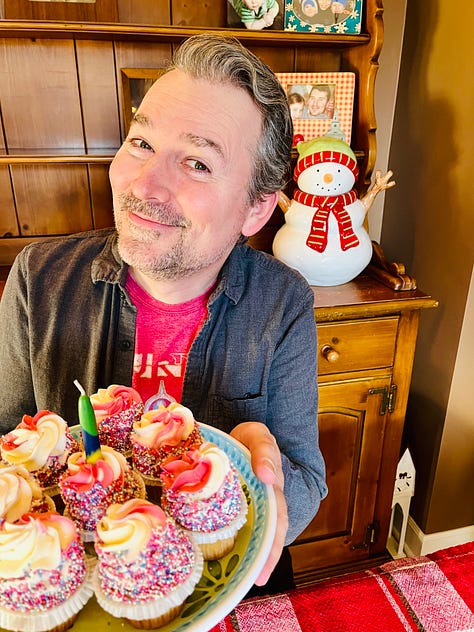
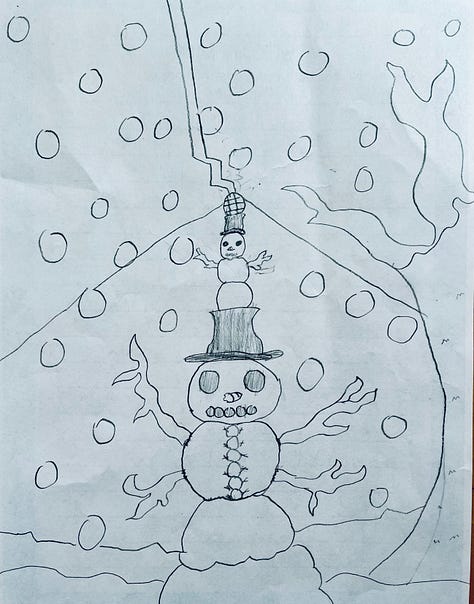
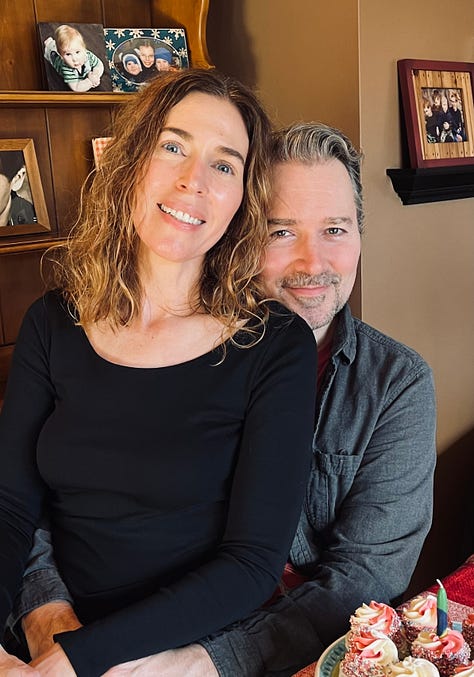
My husband Brian turned 52 last month. A few weeks later, he fell on a patch of ice while running through the woods and dislocated his shoulder. Healing is slower after 50 and falls are more dangerous. But, he’s on the mend and has a good sense of humor, as always.
When I first met Brian, he was doing stage makeup for a community Phantom of the Opera play. He specialized in aging faces. From the start, he seemed like he’d be a fun person to grow old with. He didn’t see aging or “beauty” the way most people did (the way I did then). We’re all uniquely beautiful in ways that change, with splendid finery layered on with each passing decade, but we’re still the same souls.
I wrote in my diary how Brian brought out a child-like fun in me I’d grown out of by age 10 and thought I’d never have again. Keeping a child-like joy can help heal and connect. And it feels really needed right now. I wish that for everyone ❤️
Links I like and you may too:
newsletter by : Mariah is a fantastic writer, editor, and visual storyteller. I first found her work on LinkedIn when she shared a photography project. Everything she creates is truly a gift to savor. Anyone would be really lucky to have a chance to work with her.Can we talk about this horrendous job market? by
: Jenna’s posts are spot-on and always relevant. Horrendous, for sure, for younger and older workers alike. Recruiters I’ve talked to are getting immediately flooded with apps, especially for fully remote positions. : A photographer and writer, Zachary’s newsletter shares his own work and also features profiles of photography artists like in this post. Office spaces aren’t photographed enough! Zachary’s descriptions are soothing-reads that help slow my brain when I need a break from overthinking.World War I Propaganda: I’ve been listening to C-SPAN Lectures in History for years. (I would be a forever college student if I could.) This topic seemed fitting given the surreal level of variances in “facts.” In some ways, almost everything has some element of propaganda, which then makes it easier for someone to say it’s all the same. I came away thinking I should try to persuade less and enlighten more, starting with myself.
“The Side Effects of Inequality: How Lack of Diversity in Clinical Trials Affects Drug Effectiveness and Safety”— I was honored to write this piece for the MedShadow Foundation. A quote from Dr. Clyde Yancy so succinctly explains why diversity and inclusion in clinical research matters: "This is not a political issue. It's not even a social issue. It's a people issue. Folks want to get good care. They want to know that the treatment that we prescribe will work for them."
Next post: Why Do Demure Expectations Still Haunt Girls and Women Today?
Swift, A., Liew, S., Weinkle, S., Garcia, J. K., & Silberberg, M. B. (2021). The Facial Aging Process From the "Inside Out". Aesthetic surgery journal, 41(10), 1107–1119. https://doi.org/10.1093/asj/sjaa339


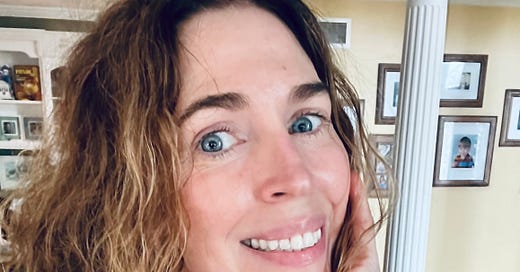




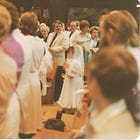

Congrats on these two years! I loved reading this. And thank you so so much for the shout out, your support and kindness warms my heart🤎
Congrats on two years of writing, Daphne! Woohoo!